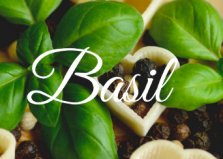
Source: webmd.com-https://www.webmd.com/diet/health-benefits-basil#1
Originally native to India, Asia, and Africa, basil was held to be a sacred and noble herb. In fact, the word “basil” comes from the ancient Greek “basilikhon” which means “royal”.
Today, Ocimum basilicum (the scientific name for basil) grows in many places around the world. Many people even grow basil in their kitchens or gardens. This fragrant herb is used as a seasoning in a variety of dishes, and plays a key role in Italian and Thai cuisine.
There are more than 60 varieties of basil, with sweet basil being one of the most widely used. The herb has rounded leaves that are often pointed. It’s a bright green plant, although some varieties have hints of purple or red in their leaves.
Sweet basil has a very strong smell and a recognizable flavor. Different varieties of basil offer slightly different flavors. For instance, lemon basil has a tangy lemon taste, while mint basil has a refreshing minty taste.
Basil makes a colorful and flavorful addition to many different dishes. It can also provide some serious health benefits.
Health Benefits
Basil contains many vitamins and minerals, as well as antioxidants such as lutein, zeaxanthin, beta-carotene, and beta-cryptoxanthin. Many of basil’s health benefits come from these antioxidants, as well as its essential oils. These compounds mostly disappear during the drying process, so opt for fresh basil whenever possible to gain the most benefits.
Health benefits of basil include:
Reduction of Oxidative Stress
Basil is full of antioxidants. Sweet basil contains a compound called eugenol, and lime and lemon basils have limonene. These antioxidants, along with others such as anthocyanins and beta-carotene, help to fight free radicals in the body that can otherwise lead to cell damage and increase your risk for a variety of health conditions, including cancer, heart disease, arthritis, and diabetes.
Holy basil, also called tulsi, is a bit different from the sweet basil you use in your favorite recipes. Still, its phytochemicals can help to protect against different types of cancer, including lung cancer, liver cancer, oral cancer, and skin cancer.
Blood Sugar Regulation
Adding basil to your diet may help to reduce high blood sugar levels. In a study performed on rats with diabetes, basil extract helped to do just that. Basil may also be helpful in treating the long-term effects of high blood sugar.
Heart disease Prevention
The eugenol in basil can block calcium channels, which may help to lower blood pressure. The essential oils in the herb can help to lower your cholesterol and triglycerides. Basil also contains magnesium, which can help to improve blood flow by allowing muscles and blood vessels to relax.
Improved Mental Health
Tulsi is a popular herb in Ayurvedic medicine. Research has shown that it has many benefits, including improving your mental health. It has compounds that can help to alleviate anxiety and depression, increase your ability to think clearly, and lower the risk for age-related memory loss.
Reduced I nflammation
Essential oils in basil, including eugenol, linalool, and citronellol, can help to fight inflammation in the body. These anti-inflammatory properties can help to lower the risk of inflammatory conditions such as arthritis. heart disease, and bowel issues.
Protection Against Infections
Basil has antibacterial properties. The oils in the herb may help to fight bacteria in people with respiratory, urinary, abdominal, and skin infections.
Nutrients Per Serving
In 2 tablespoons (5 grams) of fresh chopped basil, you’ll find:
- Calories: 1
- Protein: 0.2 grams
- Fat: 0 grams
- Carbohydrates: 0.1 grams
- Fiber: 0.1 grams
- Sugar: 0 grams
Basil also has many other vital nutrients in it. These nutrients include:
- Calcium
- Vitamin A
- Vitamin K
- Manganese
- Magnesium
- Iron
- Zinc
- Potassium
How to Prepare Basil
You can purchase fresh basil in the produce section at most grocery stores. If you need dried basil, you’ll likely find it with other dried herbs and spices. When buying fresh basil, look for vibrant, deep green leaves. Store it in the refrigerator wrapped in a slightly damp cloth or paper towel.
There are many ways to enjoy basil. If you’re looking to incorporate into your diet, consider some of the following:
- Layer basil with fresh mozzarella cheese and tomato slices, add some fresh cracked black pepper, and drizzle with olive oil
- Use it to finish a freshly cooked pizza or pasta dish (whole or chopped)
- Blend it into homemade soups or sauces
- Add it to homemade pesto or hummus
- Place it with vegetables in a lasagna
- Mix it into a salad, such as a grilled corn salad or watermelon salad
- Garnish vanilla ice cream with a couple of small basil leaves.
Keep in mind that when you’re cooking with basil, it’s best to add the leaves toward the end of the process. The oils are volatile, so adding the herb at the end allows it to keep more of its delicious flavor.

